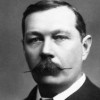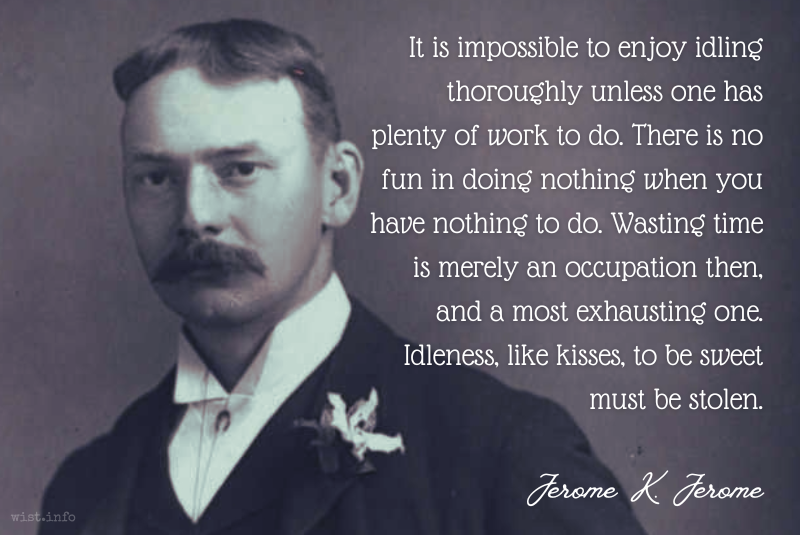Stuff yourself with food all day, never give your mind anything to do, and you’re a problem! There’s chess, isn’t there? There’s weiqi, isn’t there? — wiser at least to busy yourself with these.
[飽食終日、無所用心、難矣哉、不有博弈者乎、爲之猶賢乎已]
[饱食终日无所用心难矣哉不有博弈者乎为之犹贤乎已]Confucius (c. 551- c. 479 BC) Chinese philosopher, sage, politician [孔夫子 (Kǒng Fūzǐ, K'ung Fu-tzu, K'ung Fu Tse), 孔子 (Kǒngzǐ, Chungni), 孔丘 (Kǒng Qiū, K'ung Ch'iu)]
The Analects [論語, 论语, Lúnyǔ], Book 17, verse 22 (17.22) (6th C. BC – AD 3rd C.) [tr. Watson (2007)]
(Source)
There is varied discussion in footnotes as to the specific identity and nature of the game(s) Confucius references. The phrase bo yi or po yi (博弈) can be translated either as "to play chess" or "the game of bo and the game of yi." The game of bo was similar to weiqi (wei-ch'i) (or, in Japan, go; the game of yi was a game like chess, or a board game played with dice (shuanglu), the rules of which have been forgotten. There are also translators who assert it's the other way around, that bo or liubo is the game of chance, and yi was weiqi (go).
(Source (Chinese) 1, 2). Alternate translations:
Hard is it to deal with him, who will stuff himself with food the whole day, without applying his mind to anything good! Are there not gamesters and chess players? To be one of these would still be better than doing nothing at all.
[tr. Legge (1861)]
Ah, it is difficult to know what to make of those who are all day long cramming themselves with food and are without anything to apply their minds to! Are there no dice and chess players? Better, perhaps, join in that pursuit than do nothing at all!
[tr. Jennings (1895)]
It is a really bad case when a man simply eats his full meals without applying his mind to anything at all during the whole day. Are there not such things as gambling and games of skill? To do one of those things even is better than to do nothing at all.
[tr. Ku Hung-Ming (1898)]
How hard is the case of the man who stuffs himself with food the livelong day, never applying his mind to anything! Are there no checker or chess players? Even to do that is surely better than nothing at all.
[tr. Soothill (1910)]
Stuffing in food all day, nothing that he puts his mind on, a hard case! Don't chess players at least do something and have solid merit by comparison?
[tr. Pound (1933)]
Those who do nothing all day but cram themselves with food and never use their minds are difficult. Are there not games such as draughts? To play them would surely be better than doing nothing at all.
[tr. Waley (1938)]
I really admire a fellow who goes about the whole day with a well-fed stomach and a vacuous mind. How can one ever do it? I would rather that he play chess, which would seem to me to be better.
[tr. Lin Yutang (1938)]
To eat one’s full all day long without directing the mind to anything is, indeed, to be in difficulties! Even those who spend all their time at intricate games are to be reckoned of higher caliber.
[tr. Ware (1950), 17.20]
It is no easy matter for a man who always has a full stomach to put his mind to some use. Are there not such things as po and yi? Even playing these games is better than being idle.
[tr. Lau (1979)]
It is surely difficult to spend the whole day stuffing oneself with food and having nothing to use one's mind on. Are there not people who play bo and yi? Even such activity is definitely superior, is it not?
[tr. Dawson (1993), 17.20]
I cannot abide these people who fill their bellies all day long, without ever using their minds! Why can't they play chess? At least it would be better than nothing.
[tr. Leys (1997)]
Those who are stated with food all day without applying their minds to anything at all are difficult indeed! Are there no people who play double six and siege? Even doing those would be beter than to stop thinking altogether.
[tr. Huang (1997), 17.21]
Eating all day without thinking about anything, such persons are hard to be trained. Are not there some games? Even if playing some games, it is also better than having nothing to do.
[tr. Cai/Yu (1998), No. 462]
There are troubles ahead for those who spend their whole day filling their stomachs without ever exercising their heart-and-mind (xin). Are there not diversions such as the board games of bo and weiqi? Even playing those games would be better than nothing.
[tr. Ames/Rosemont (1998)]
One who eats his fill all day long, and never uses his mind on anything, is a difficult case. Are there not such things as gammon and chess? Would it not be better to play them?
[tr. Brooks/Brooks (1998), 17.20]
All day eating and never thinking: such people are serious trouble. Aren't there games to play, like go and chess? Even that is better than nothing. [tr. Hinton (1998), 17.21]
Spending the entire day filling himself with food, never once exercising his mind -- someone like this is a hard case indeed! Do we not have the games Bo and Yi? Even playing these games would be better than doing nothing.
[tr. Slingerland (2003)]
To spend the whole day stuffing yourself and not to put your mind to use at all -- this is hopeless behavior. Are there not such games as bo and yi? It would be better to play these games [than to do nothing at all].
[tr. Annping Chin (2014)]
If a person is well fed the whole day and does not use his brain on anything, it will be difficult for him to be of value in life. Are there poker games and chess? Playing these games is still more beneficial than doing nothing.
[tr. Li (2020)]
Quotations about:
idleness
Note not all quotations have been tagged, so Search may find additional quotes on this topic.
There is always something pleasurable in the struggle and the victory. And if a man has no opportunity to excite himself, he will do what he can to create one, and according to his individual bent, he will hunt or play Cup and Ball: or led on by this unsuspected element in his nature, he will pick a quarrel with someone, or hatch a plot or intrigue, or take to swindling and rascally courses generally — all to put an end to a state of repose which is intolerable.
[Der Kampf mit ihnen und der Sieg beglückt. Fehlt ihm die Gelegenheit dazu, so macht er sie sich, wie er kann: je nachdem seine Individualität es mit sich bringt, wird er jagen, oder Bilboquet spielen, oder, vom unbewußten Zuge seiner Natur geleitet, Händel suchen, oder Intriguen anspinnen, oder sich auf Betrügereien und allerlei Schlechtigkeiten einlassen, um nur dem ihm unerträglichen Zustande der Ruhe ein Ende zu machen.]
Arthur Schopenhauer (1788-1860) German philosopher
Parerga and Paralipomena, Vol. 1, “Aphorisms on the Wisdom of Life [Aphorismen zur Lebensweisheit],” ch. 5 “Counsels and Maxims [Paränesen und Maximen],” § 2.17 (1851) [tr. Saunders (1890)]
(Source)
(Source (German)). Alternate translation:
The struggle with [obstacles] and the triumph make him happy. If he lacks the opportunity for this, he creates it as best he can; according to the nature of his individuality, he will hunt or play cup and ball; or, guided by the unconscious urge of his nature, he will pick a quarrel, hatch a plot, or be involved in fraud and all kinds of wickedness, merely in order to put an end to an intolerable state of repose.
[tr. Payne (1974)]
Blowing a gale all day. Nothing to do and we did it.
Arthur Conan Doyle (1859-1930) British writer and physician
Journal of Arctic voyage (19 Jul 1880)
(Source)
That the greatest of evils is idleness, that the poor are the victims, not of circumstances, but of their own “idle, irregular, and wicked courses,” that the truest charity is not to enervate them by relief, but so to reform their characters that relief may be unnecessary — such doctrines turned severity from a sin into a duty, and froze the impulse of natural pity with an assurance that, if indulged, it would perpetuate the suffering which it sought to allay.
R. H. Tawney (1880-1962) English writer, economist, historian, social critic [Richard Henry Tawney]
Religion and the Rise of Capitalism, ch. 4, sec. 4 (1926)
(Source)
It is impossible to enjoy idling thoroughly unless one has plenty of work to do. There is no fun in doing nothing when you have nothing to do. Wasting time is merely an occupation then, and a most exhausting one. Idleness, like kisses, to be sweet must be stolen.
Jerome K. Jerome (1859-1927) English writer, humorist [Jerome Klapka Jerome]
“On Being Idle,” Idle Thoughts of an Idle Fellow (1886)
(Source)
There is no kind of idleness by which we are so easily seduced as that which dignifies itself by the appearance of business.
Samuel Johnson (1709-1784) English writer, lexicographer, critic
The Idler, #48 (17 Mar 1759)
(Source)
Let everyone, then, do something, according to the measure of his capacities. To have no regular work, no set sphere of activity — what a miserable thing it is! How often long travels undertaken for pleasure make a man downright unhappy; because the absence of anything that can be called occupation forces him, as it were, out of his right element. Effort, struggles with difficulties! that is as natural to a man as grubbing in the ground is to a mole. To have all his wants satisfied is something intolerable — the feeling of stagnation which comes from pleasures that last too long. To overcome difficulties is to experience the full delight of existence.
[Inzwischen treibe jeder etwas, nach Maßgabe seiner Fähigkeiten. Denn wie nachteilig der Mangel an planmäßiger Tätigkeit, an irgend einer Arbeit, auf uns wirke, merkt man auf langen Vergnügungsreisen, als wo man, dann und wann, sich recht unglücklich fühlt; weil man, ohne eigentliche Beschäftigung, gleichsam aus seinem natürlichen Elemente gerissen ist. Sich zu mühen und mit dem Widerstande zu kämpfen ist dem Menschen Bedürfnis, wie dem Maulwurf das Graben. Der Stillstand, den die Allgenugsamkeit eines bleibenden Genusses herbeiführte, wäre ihm unerträglich. Hindernisse überwinden ist der Vollgenuß seines Daseins.]
Arthur Schopenhauer (1788-1860) German philosopher
Parerga and Paralipomena, Vol. 1, “Aphorisms on the Wisdom of Life [Aphorismen zur Lebensweisheit],” ch. 5 “Counsels and Maxims [Paränesen und Maximen],” § 2.17 (1851) [tr. Saunders (1890)]
(Source)
(Source (German)). Alternate translation:
Nevertheless, everyone should do something according to the measure of his abilities. For on long pleasure-trips we see how pernicious is the effect on us of not having any systematic activity or work. On such trips we feel positively unhappy because we are without any proper occupation and are, so to speak, torn from our natural element. Effort, trouble, and struggle with opposition are as necessary to man as grubbing in the ground is to a mole. The stagnation that results from being wholly contented with a lasting pleasure would be for him intolerable. The full pleasure of his existence is in overcoming obstacles.
[tr. Payne (1974)]









